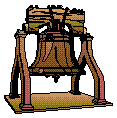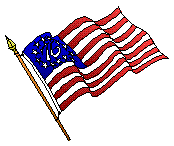Here now, we introduce to you, the 56 men who signed the Declaration of Independence.

John Hancock (Jan. 23, 1737 - Oct. 8, 1793) Massachusetts
Hancock was the first man to put his name on the Declaration, writing it large enough so the king "could see it without using his spectacles," which now gives us the term, "signing your John Hancock." He Inherited his uncle's firm, Thomas Hancock & Co., and became the wealthiest merchant in Boston. Hancock emerged as a leading figure in the revolutionary movement and in 1774 was chosen president of the Massachusetts Provincial Congress. Elected to the Second Continental Congress, he was chosen president of Congress. He resigned in 1777 in disappointment over the failure of Congress to make him commander in chief of the Continental Army, but he continued to be active in Massachusetts politics, serving as governor for nine terms between 1780 and 1793. Unwilling to face the disturbances that resulted in Shays's Rebellion, he resigned from the governorship in 1785 and returned to office only after the uprising had been supressed.
Josiah Bartlett (Nov. 21, 1729 - May 19, 1795) New Hampshire
Bartlett began serving in the provincial legislature in 1765, after establishing a successful medical practice. By 1770, he was also a justice of the peace and commander of a militia regiment, but the British governor dismissed him from these positions in 1775 because of his support of the colonial cause. He helped write the Articles of Confederation. Bartlett served as chief justice of the New Hampshire court of common pleas from 1779 to 1788, when he was named chief justice of the superior court. Bartlett was elected New Hampshire's chief executive in 1790, and when the title of that office was changed in 1793, he was elected the state's first governor, serving in that position for another year before retiring. Bartlett also organized and was the first president of the New Hampshire Medical Society in 1791.
Matthew Thornton (1714 - June 24, 1803) New Hampshire
Thornton immigrated to America from Ireland with his parents around 1718. After studying medicine, he opened a practice in Londonderry, N.H. in 1740, and by the late 1750's was active in provincial politics. In 1775 he became president of the provincial congress and chairman of the committee of safety. He was elected to the Continental Congress in 1776 and again in 1778. After his return to New Hampshire, Thornton served as a state senator from 1784 to 1786.
William Whipple (Jan. 14, 1730 - Nov. 10, 1785) New Hampshire
Whipple was a sea captain and engaged in the slave trade, before settling Portsmouth, N.H., where he went into business with his brother in 1760. He became active in patriot circles and in 1776 was elected to the Continental Congress, serving there until 1779. As a brigadier general in the militia, Whipple fought at the Battle of Saratoga in October 1777. He helped negotiate the surrender of the British general John Burgoyne and then helped escort the 6,000 defeated British troops to Cambridge, Mass. After the war Whipple was associate justice of the New Hampshire superior court from 1782 until 1785.
Stephen Hopkins (Mar. 7, 1707 - July 13, 1785) Rhode Island
With his brother Esek Hopkins, Stephen made a substantial fortune in business, and served several terms as governor of Rhode Island between 1755 and 1768, and he subsequently became an advocate of resistance to British taxation. In 1772, as chief justice of the Rhode Island superior court, he prevented the arrest of those responsible for burning the British revenue schooner Gaspee. In 1778, Hopkins was a delegate to congress for the last time, but served as a member of the general assembly of Rhode Island until 1779.

Summer of '76
(Summer of 76 part 1)
Click the Liberty Bell to view a brief diatribe we found on the web site of NJ 101.5 FM Radio

William Ellery (Dec. 22, 1727 - Feb. 15, 1820) Rhode Island
Ellery graduated from Harvard College in 1747 and served as a Rhode Island naval officer and as a clerk in the provincial General Assembly before opening a law practice. Ellery's home was burned and his property sacked by the British while they occupied Newport in 1776. His experience as a naval officer served him well as a member of the board of admiralty, but he also distinguished himself on committees involved in commercial affairs. After leaving the Congress in 1786, Ellery was a Rhode Island commissioner of the Continental Loan Office and collector of customs in Newport.
TO BE CONTINUED




